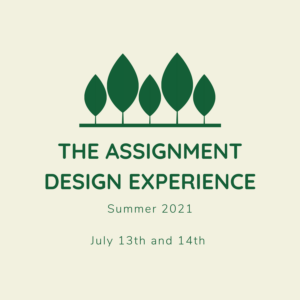Session Descriptions
Day 1: July 13, 2021
10:00 – 11:00 am ET
OPENING SESSION: What Makes a Good Assignment?
Facilitators: Tracie Addy, Associate Dean of Teaching and Learning, Director of CITLS; Manuela Borzone, Assistant Director of CITLS; Bianca Falbo, Associate Professor of English, Director, First Year Seminar; Rob Root, Professor of Mathematics; Chidi Nwankpa, Class of ‘22
What makes a good assignment? How can instructors design assignments that integrate social justice? During this kickoff session we’ll explore design frameworks and strategies that every instructor should know as they create assignments for their courses. All institute participants are encouraged to attend this preliminary session prior to participating in subsequent concurrent sessions and the assignment charrette on Days 1 and 2 of the Institute.
11:15 – 12:15 pm ET
Incorporating Primary Resources into an Assignment
Facilitators: Terese Heidenwolf, Director of Research and Instructional Services, Libraries; Lijuan Xu, Associate Director of Research and Instructional Services, Libraries; Caroline Sequin, Assistant Professor of History; Monica Salas Landa, Assistant Professor of Anthropology & Sociology
This session will begin with a report of recent research exploring how faculty use primary sources to teach undergraduates, focusing on common difficulties and effective pedagogies for addressing them. Faculty panelists who have repeatedly developed assignments using primary sources will then share their experiences and encourage participants to talk about the ways that they have or might incorporate primary sources into their own teaching.
1:30 – 3:00 pm ET
Digital Storytelling Assignments
Facilitators: Manuela Borzone, Assistant Director, CITLS; Angela Perkins, Research and Instructional Librarian; Charlotte Nunes, Director of Digital Scholarship Services; Janna Avon, Digital Initiatives Librarian
This session will introduce digital storytelling as a tool to create assignments that foster memory and comprehension, community and belonging, as well as social justice and transformation. Facilitators will showcase assignments designed for Lafayette College’s Digital Humanities Summer Scholars research intensive program, and assignment partnerships from Lafayette’s Digital Scholarship Services and the Lehigh Valley Engaged Humanities Consortium (LVEHC). We’ll be highlighting designing digital storytelling assignments using open source scholarship-focused web publishing platforms, and discussing avenues for self-education and support for digital media projects such as interactive websites, photo and video essays, and podcasts. During the second portion of the session, participants will have the opportunity to workshop a digital storytelling assignment of their choice with the group and panelists. Please bring a storytelling assignment/topic to the workshop (can be a new assignment or an existing one that you wish to adapt or develop further).
Day 2: July 14, 2021
10:00 – 11:15 am ET
Case Study Assignments
Facilitator: Tracie Addy, Associate Dean of Teaching and Learning, Director of CITLS
We know from research that people remember stories. Case studies which involve storytelling can therefore be powerful teaching and learning tools. During this session we will discuss strategies for incorporating case studies into a course whether for a single assignment or throughout the entire semester. We will also discuss opportunities to implement cases that integrate social justice issues, and present resources that can further the efforts of instructors who want to use case studies in their courses. Participants are also welcome to bring ideas for how they are considering using case studies in future courses, or discuss their previous experiences using case studies.
11:30 – 12:30 pm ET
Designing Plagiarism-Resistant Writing Assignments
Facilitator: Tim Laquintano, Associate Professor, English, Director of College Writing Program
Although we tend to think of plagiarism as cheating, plagiarism encompasses an entire spectrum of writing behaviors from malicious (purchasing a paper online) to accidental (sloppy paraphrasing). This workshop will review current research on plagiarism to provide as full a picture as possible of why and how students engage in it. It will then offer some assignment design considerations that will help instructors reduce the chances that students submit a plagiarized writing project.
1:00 – 3:30 pm ET
Virtual Assignment Charrette
Facilitators: Tracie Addy, Associate Dean of Teaching and Learning, Director of CITLS; Manuela Borzone, Assistant Director of CITLS; Nicole Tabor, Assistant Dean of Academic Initiatives, Associate Professor, Co-Director for the Teaching & Learning Center @ Moravian College; Chidi Nwankpa ’22, 2021 CITLS Student Fellow
Obtaining feedback on assignments during the design process can be a very valuable exercise. This charette will provide an opportunity for participants to give and receive feedback on their developing assignments. Participants should have access to a digital version of their assignment during the session so that it can be shared for feedback. Assignments can be at any stage of development.
